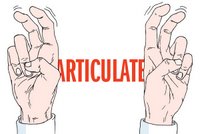
From The New York Times…
-------------------------------------------
The Racial Politics of Speaking Well
By LYNETTE CLEMETSON
SENATOR JOSEPH R. BIDEN’S characterization of his fellow Democratic presidential contender Senator Barack Obama as “the first mainstream African-American who is articulate and bright and clean and a nice-looking guy” was so painfully clumsy that it nearly warranted pity.
There are not enough column inches on this page to parse interpretations of each of Mr. Biden’s chosen adjectives. But among his string of loaded words, one is so pervasive — and is generally used and viewed so differently by blacks and whites — that it calls out for a national chat, perhaps a national therapy session.
It is amazing that this still requires clarification, but here it is. Black people get a little testy when white people call them “articulate.”
Though it was little noted, on Wednesday President Bush on the Fox News Channel also described Mr. Obama as “articulate.” On any given day, in any number of settings, it is likely to be one of the first things white people warmly remark about Oprah Winfrey; Richard Parsons, chief executive of Time Warner; Secretary of State Condoleezza Rice; Deval Patrick, the newly elected governor of Massachusetts; or a recently promoted black colleague at work.
A series of conversations about the word with a number of black public figures last week elicited the kind of frustrated responses often uttered between blacks, but seldom shared with whites.
“You hear it and you just think, ‘Damn, this again?’” said Michael Eric Dyson, a professor of humanities at the University of Pennsylvania.
Anna Perez, the former communications counselor for Ms. Rice when she was national security adviser, said, “You just stand and wonder, ‘When will this foolishness end?’”
Said Reginald Hudlin, president of entertainment for Black Entertainment Television: “It makes me weary, literally tired, like, ‘Do I really want to spend my time right now educating this person?’”
So what is the problem with the word? Whites do not normally object when it is used to describe them. And it is not as if articulate black people do not wish to be thought of as that. The characterization is most often meant as a form of praise.
“Look, what I was attempting to be, but not very artfully, is complimentary,” Mr. Biden explained to Jon Stewart on Wednesday on “The Daily Show.” “This is an incredible guy. This is a phenomenon.”
What faint praise, indeed. Being articulate must surely be a baseline requirement for a former president of The Harvard Law Review. After all, Webster’s definitions of the word include “able to speak” and “expressing oneself easily and clearly.” It would be more incredible, more of a phenomenon, to borrow two more of the senator’s puzzling words, if Mr. Obama were inarticulate.
That is the core of the issue. When whites use the word in reference to blacks, it often carries a subtext of amazement, even bewilderment. It is similar to praising a female executive or politician by calling her “tough” or “a rational decision-maker.”
“When people say it, what they are really saying is that someone is articulate … for a black person,” Ms. Perez said.
Such a subtext is inherently offensive because it suggests that the recipient of the “compliment” is notably different from other black people.
“Historically, it was meant to signal the exceptional Negro,” Mr. Dyson said. “The implication is that most black people do not have the capacity to engage in articulate speech, when white people are automatically assumed to be articulate.”
And such distinctions discount as inarticulate historically black patterns of speech. “Al Sharpton is incredibly articulate,” said Tricia Rose, professor of Africana Studies at Brown University. “But because he speaks with a cadence and style that is firmly rooted in black rhetorical tradition you will rarely hear white people refer to him as articulate.”
While many white people do not automatically recognize how, and how often, the word is applied, many black people can recall with clarity the numerous times it has stopped them in their tracks.
[Click on the essay title above to read the full story.]

2 comments:
my comment is to the snarky tone of the piece in the Times -- the idea that blacks have some kind of truly legitimate gripe with whites who think them inarticulate much of the time.
The fact is that even liberal whites -- and others who are politically conservative, but not prone to racist, shallow, judgements -- are mystified by the common inability of blacks to speak clearly and coherently.
The accent that many blacks have, and cannot seem to shake generation after generation, is one source of chronic puzzlement for whites. The vocabulary issue is secondary, but also a problem that confronts whites when they hold discussions with most blacks.
Most whites I know speak very differently to blacks than to other whites. A lot more of the "yup, yup" kind of thing. More saying "word?".
One thing that I think favors black speech -- that is a reminder to all of us -- is that blacks are generally more polite and respectful in speech. They are also more likely to communicate their personalities in their speech, and more likely to have more fun in conversations. I laugh more when I talk to black friends, there is often more leeway, and more warmth there.
anonymous, please stay that way. the gripe is legitimate. just ask one of your fun-loving, polite and respectful black friends.
Post a Comment